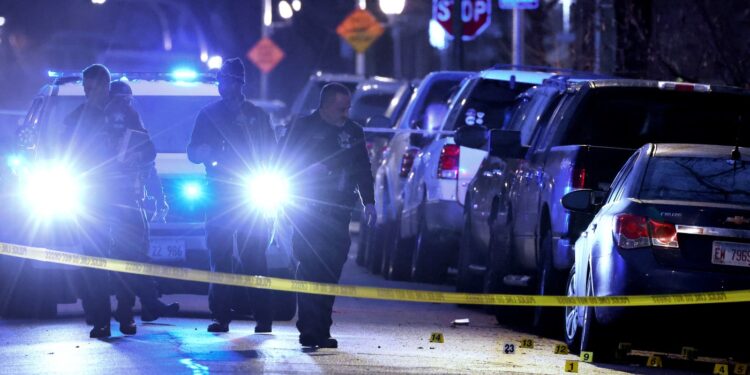
As 2024 nears its end, Chicago Mayor Brandon Johnson and police Superintendent Larry Snelling on Tuesday again highlighted citywide drops in several violent crime categories, asserting that the city’s public safety efforts will remain steadfast in the coming year.
Johnson credited an oft-mentioned “whole of government approach” for the reductions, and noted that the Police Department can’t bear all responsibility for the city’s crime patterns.
“This city, of course, that we all love … there are still too many people who are being harmed by gun violence,” Johnson told reporters at CPD headquarters. “The progress, though, that we have made by building stronger and safer communities this year certainly reflects a coordinated effort and a coordinated plan that has been driven by people and our place-based approach.”
Johnson said he was thankful for those who have made it happen.
“I am grateful for the superintendent, his entire team, his leadership and the tireless efforts of the Chicago Police Department, the rank-and-file officers who are on the front lines, who are working to solve crimes and to deliver justice,” Johnson said.
With 572 homicides recorded as of Dec. 27, according to city data, 2024 was the third consecutive year that Chicago recorded fewer homicides than the previous year. In 2023, the city ended the year with 620 killings, records show. Tuesday, Johnson incorrectly said 2024’s totals were the lowest “in a decade.”
Snelling told reporters that, in addition to the decline in homicides, the city also recorded a 7% drop in total shooting incidents and a 4% decline in the number of overall shooting victims. CPD’s bureau of detectives cleared 322 murder cases in 2024, leading to a clearance rate of 56%, Snelling said.
“You can’t go into a new year with some, simply, old ideas. We have to have new ideas,” Snelling said Tuesday. “We have to have a focus on what it is that we’re trying to reduce. And if we’re trying to reduce violent crime, the most important thing here is to get to the bottom of it, resolve it, hold those accountable who are committing those violent acts, break down crime patterns, and when we can do that we start to see a reduction in crimes.”
Robberies and motor vehicle thefts also fell by 17% and 25%, respectively, CPD data show. Chicago cops again recovered more than 12,000 guns and made more than 32,000 arrests during the year.
Both the mayor and superintendent also highlighted CPD’s efforts to offer resources and support to crime victims and their families. Snelling also repeatedly thanked members of the public for their willingness to engage with the department in an effort to stem crime.
“The support that we’ve seen by everyday citizens who just want to see safety in their communities, safety across the city,” Snelling said. “They get nothing for doing that and they have stepped up to make sure that they’ve shown support. We’ve gotten more calls, more cooperation from communities, and that’s a result of the work that’s being done by the leadership team in creating that trust with communities.”
Speaking at a community meeting on the Northwest Side in early December, Snelling laid out six objectives for the Police Department in 2025.
They include ensuring officers have strong foundations in constitutional and impartial policing; making progress in the long-awaited workforce allocation study; building and fostering community partnerships; encouraging officer wellness; providing resources and support to crime victims; and to making sure CPD officers are clear on the department’s policy relating to associations with criminal or biased organizations.
Originally Published:







